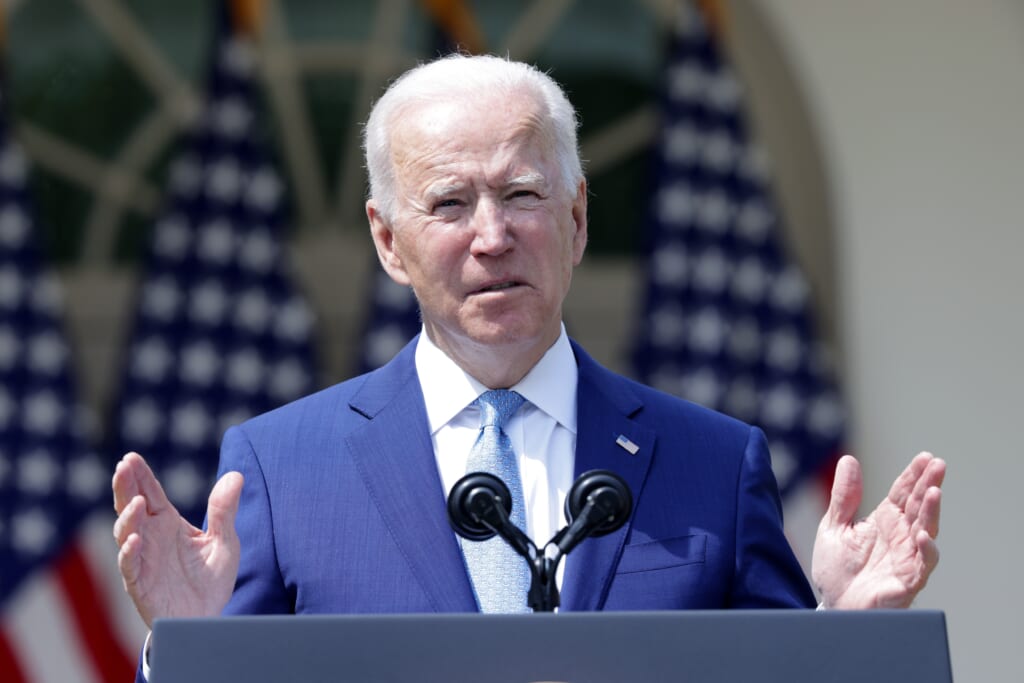As world awaits Chauvin verdict, police reform remains work in progress
Exclusive: Sources tell theGrio that President Joe Biden is preparing for the Chauvin trial outcome, but attempts to rein in bad policing will be a great challenge
President Joe Biden, in recents weeks, has mulled over several scenarios for federal reaction to the impending verdict of the Derek Chauvin trial. The goal for each option on the table is to get ahead of potentially violent protests that could arise across the country following the jury’s decision.

The president shared his plans with civil rights leaders and members of the Congressional Black Caucus but did not provide in-depth detail.
Read More: Derek Chauvin murder trial could be the verdict of a generation
As these plans are being considered, Biden’s Justice Department appointees have yet to be confirmed by the U.S. Senate.
One option in response to some of expected violence involves the president working with states to address the matters.

Meanwhile, as it relates to the trial itself, this is beyond qualified immunity according to Floyd family attorney, Lee Merritt, who tells theGrio that this is about “criminal liability” for Minneapolis police officer Chauvin. Merritt made those comments while in Minnesota on Friday days before the conclusion of the trial.
Merritt believes Chauvin is criminally liable for kneeling on the neck of George Floyd for over 9 minutes and 29 seconds, which resulted in bones being broken in Floyd’s neck and also lowering Floyd’s oxygen intake. This is what the prosecution claims killed Floyd on May 25, 2020.
The defense is blaming illicit drugs and Floyd’s heart condition for his death. But it’s Chauvin’s actions that are on trial.

Former New York Governor David Paterson told theGrio, “there are very few police officers that demonstrate this misconduct. But the question is, what do we have to do to put them behind bars?”
That question is being placed before President Biden who says he’s not ready to offer his proposal on policing reform just yet. However, on the other end of Pennsylvania Avenue in the U.S. House and Senate, lawmakers are working on getting the George Floyd Justice in Policing Act to the president’s desk. If passed, the legislation would create a database as it relates to these types of policing crimes and make it less difficult to charge a police officer for the death of a civilian.
The bill also gives the Department of Justice more latitude on investigations and actions against police departments that violate policing laws. It also calls for mandatory police use of body cameras. However, attorney Merritt pointed out that evidence proves body cameras have not deterred bad policing. He said there was a camera on Derek Chauvin, and yet he still killed George Floyd in the way he did.
Former Congressman of New York Charlie Rangel thinks the problem with policing is the “blue wall of silence.” Many commentators over the weekend have speculated that this wall has come tumbling down during the trial as a strategy by police in hopes of relieving the intense focus of the public if Chauvin is found guilty.

But Rangel, 90, contended the loyalty of officers to even the bad apples through silence and complacency has occurred his whole life. He said the problem within police departments will continue until each officer develops a “not in my outfit, you don’t” attitude toward misconduct they witness first hand.
Rangel said this would mean officers have “so much pride collectively that you would not allow one of your own to violate” the integrity of the badge.
Currently, U.S. Senator Cory Booker (D-N.J.) is working with fellow Senator Tim Scott (R-S.C.) on this issue. Scott has offered compelling stories of encounters with the police that were based on race. Booker is hopeful this moment will produce something that can begin to cut into this centuries-old problem of bad policing and the Black community.
Senator Booker said on Friday that the current state of the criminal justice system is “tragic.”

“It has undermined our communities,” Booker told theGrio. “[It has] cost African Americans billions of dollars in lost opportunities.”
He added, “so many of our children have been savagely murdered.”
Attorney Lee Merritt said he is also working with white conservatives in Texas to change the tide of deadly policing. One of the many issues Merritt wants to change is when the federal government becomes involved in these cases. Currently, the federal government only intervenes when deadly force is demonstrated to be “intentional.”
Merritt is planning to run for Texas attorney general in an attempt to improve the policing system in this country. He intends to make the official announcement in May.
But as former New York Gov. Patterson cautions, “even when things get better, they could be a prelude to getting worse, which is why we keep fighting even when we’re winning.”
Have you subscribed to theGrio’s “Dear Culture” podcast? Download our newest episodes now!
TheGrio is now on Apple TV, Amazon Fire and Roku. Download theGrio.com today!
More About:Politics

